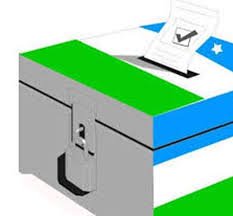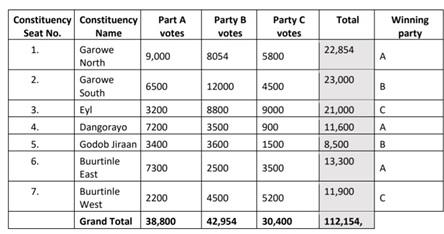By Abdiwahid A. Jama and Abdullahi S. Osman
Puntland Diaspora Volunteer Group – UK
Introducing a democratic programme and popular elections has been a long-term aspiration of the people in Puntland. All past administrations solemnly promised transforming the political system making it more representative but, in the end, failed to deliver. Although the new government completed within a relatively short period the formation of a credible electoral commission, enormous hurdles remain. The legal framework underpinning much of the processes and procedures for instance still require fine-tuning— more fundamentally the adoption of a suitable electoral model for the parliament is still a work in progress, and a final decision is yet to be signed off.

Finding an electoral system commanding full confidence of the people, would, therefore, be the grand finale of Puntland’s quest for a suitable democratic order and doing away with the much-ridiculed tribal selection system. Wild rumours of tribal chiefs proposing members whose only qualifications were being their relatives or in-laws and similar equally absurd stories would at long last be a thing of the past. There is a yearning for a better governance system serving not only to strengthen the fledgling public institutions but also help dealing with the insidious militant activity in the state.
Puntland’s 66-member assembly plays a pivotal role not only electing the president and vice president but also discharging their other duties of scrutiny and passing laws. That number of members, although not ideal, has up to now kept serious complaints to a minimum and helped maintain stability. There even seems to be a consensus that disturbing this arrangement could be tantamount to opening a pandora’s box potentially delaying the much-anticipated election timeline.
When it comes to choosing the right electoral model there is no shortage of examples from experiences elsewhere in the world but none of these was designed in regards to nomadic tribal societies recovering from state failure and with no population census. The challenge now facing decision-makers is adopting a suitable electoral system combining simplicity, practicality in its implementation, and crucially maintaining the present level of clan representation. Far from being anachronistic, these representation quotas could be considered as the bedrock of unity and social harmony in the region. Devising a model with prearranged community distribution formula dovetailing a fully democratic process is, therefore, a monumental task not easy to achieve without careful consideration and creativity.
The Mixed Member System
The task in front of the government is coming up with a credible electoral model underpinned by robust legal framework and the wherewithal to hold the first ever polls in the province. Getting the mechanism of the election process right is, therefore, a matter of utmost importance and should have the following characteristics as a minimum standard:
1) Easy to understand by the majority of voters irrespective of their literacy level
2) Ensure free and fair polls based on the principle of one person one vote.
3) Provide electors with the opportunity of a real choice to decide whom to vote for in terms of talent and policy agenda.
4) Guarantee inclusivity where all eligible voters feel that their voice is heard and their votes matter.
5) Maintain the current composition vis-à-vis clan representation in the legislature, e.g. all communities with members in parliament today would maintain their quotas after the election.
It is this last point so crucial to the success of the electoral venture that is posing the most formidable challenge. That is why the only model that would satisfy all the criteria mentioned above is a version of Mixed Member System (MMS); we can call it MMS-Variant or simply MMS for short. This type of MMS envisages single-member constituencies supplemented with a top-up of additional seats. It is the most straightforward system for everyone to understand whether they are highly educated or lack the necessary skills in reading and writing. Under this model, voters get one ballot paper and put a cross in front of a candidate representing a political party, and the job is done.
Similarly, counting the votes cast and declaring the result is incredibly simple and could be concluded in less than 24 hours after polling stations close with the added advantage of costing less compared to other methods. The majority of the seats would be single-member constituencies using a majoritarian (first past the post) system within an administrative region. The remaining seats would be awarded to the Party winning the highest number of votes in the region. And here is where it deviates from the classic MMS by awarding all the additional seats to the most popular Party in a winner take all fashion instead of distributing them proportionally. In essence, this is a hybrid form of MMS born out of necessity brought about by an unusual set of circumstances. Altering electoral models to suit a unique situation is not, however unheard of, and the literature on election theory and practice is replete with examples of such adjustments. To further illustrate how it would work on the ground, we take the Nugal region as an example.
The table below shows an indicative scenario.

In this case, Party A wins the highest number of constituency seats in the region, three out of seven, but not the most significant share of the vote and is not as a result, the most popular party. That goes to Party B therefore winning the two additional seats in the region as the table below indicates.

The final result in the region therefore would look like this: Party B is now the party with most of the seats; two constituencies and the 2 additional seats altogether 4 seats followed by Party A now in second place with 3 seats and Party C winning 2 seats completing the line-up of the Nugal region members in parliament. Other regions would follow a similar pattern.

The top-up candidates are predetermined and submitted to the electoral commission at the same time as the prospective constituency candidates by the parties and could not be changed afterwards. Submitting a single list of candidates by political parties in a region would underscore parity within the two sets of candidates with no distinction between them once elected. The advantage of rewarding the most successful party attracting support from across the region is two-fold. Firstly, it helps maintain fairness, ensuring that seats are won by the community earmarked for the particular slot. It helps to avoid a scenario for instance where a candidate from a particular community is topping the list in one political party with another from the same background also being in number one position in another party both winning seats that way from the top-up allocation. Such an outcome would defeat the purpose of filling seats in an equitable way and maintaining a sense of proportionality in the assembly. But more importantly, it increases the influence of these groups by enabling them to concentrate their voting power scattered within a particular region.
Rather than being side lined, competing parties would campaign hard to win their support, accommodating their priorities in their election manifestos. In marginal seats where no one party is dominant, they could even hold the balance swaying the result one way or the other. Overall Nugal region with only two additional seats out of 9 would be the one with the least of top-up members and Mudug in this scenario would have the highest additional members with 4 out of their 10-seat contingent.
The Alternatives
Other techniques widely used in many parts of the world are also available, including the Alternative Vote (AV), Single Transferable Vote (STV) and many variations of them. But all these models require a degree of sophistication and computing skills not only from the part of staff managing the process but also from the wider voting public. Electors under these schemes are expected to rank their preferences by numbering them from 1 to 3 at least disadvantaging willy nilly those with limited reading and writing abilities; in other words, the bulk of potential voters. The counting method in these systems is even more complicated requiring the elimination of parties with fewer votes and aggregating the second or even third preferences on their ballots until a winner emerges. And here, the successive rounds of counting and recounting could potentially create opportunities for mistakes heightening suspicions of irregularities and vote-rigging.
Similarly, the proportional representation method based on the closed party-list suffers from the fatal flaw of upsetting community balance in parliament. It regards the state as one constituency with seats distributed according to the share of the vote won by individual parties. It is not only impossible to maintain community balance, but is also difficult to operate using complex formulae, e.g. Sainte-Lague method or similar, uncomfortably delaying the declaration of the results.
Other Factors
The lack of reliable data on population size and distribution in Puntland militates against the introduction of a new system that would upset the profile of the legislature potentially leading to confusion and uncertainty.
The significance of maintaining community balance could not be overemphasised as president and vice heading the most prominent branch of the state are elected by the assembly and not directly by the people in Puntland. Although in theory, political parties are supposed to present a programme that would appeal to a broader section of society irrespective of background in practice support for a party would tend to overlap with traditional loyalties.
Democracy is principally a rule by the majority and protection of minority rights, although, the definition of who is a minority is fluid in Somalia’s segmentary lineage-based kinship structure. Nonetheless denying entire sections of taxpaying citizenry, a say in the decisions and regulations that directly affect their lives is nothing other than infringement of their basic rights.
While selecting the right model is an absolute necessity for elections firm determination and a commitment to make a success of the plan by all concerned is just as important. The reasons behind the failures of previous attempts were indeed the desire by the then incumbents to bend the process in their favour to guarantee their re-election dampening widespread enthusiasm for the initiative. Integrity and efficiency are, therefore, essential ingredients to put Puntland, dubbed the mother of federalism in Somalia, on a pedestal becoming the first federal member state in the country to hold popular elections.
Conclusion
Introducing democratic practices in Puntland, the first federal member state in Somalia is long overdue. Holding free and fair elections would encourage accountability doing away with the inefficiency that hindered development in the province despite the advantage of functioning as a self-governing state for over 21 years.
Short of increasing the 66-member assembly, the version of MMS electoral model described here is probably the only one capable of combining simplicity, genuine democratic engagement while at the same time preserving community equilibrium in the legislature.
All in all, the litmus test for the success of the democratisation project depends on striking the right balance between democracy and community cohesion, coupled with practical and satisfactory implantation of the process.
As the deliberations on the modalities of suitable electoral method progress, this version of MMS will no doubt contribute to these crucial discussions.
For more information Please contact:
Puntland Diaspora Volunteer Group – UK:
Abdiwahid A. Jama and
Abdullahi S. Osman
Email: [email protected]
We welcome the submission of all articles for possible publication on WardheerNews.com. WardheerNews will only consider articles sent exclusively. Please email your article today . Opinions expressed in this article are those of the author and do not necessarily reflect the views of WardheerNews.
WardheerNew’s tolerance platform is engaging with diversity of opinion, political ideology and self-expression. Tolerance is a necessary ingredient for creativity and civility.Tolerance fuels tenacity and audacity.
WardheerNews waxay tixgelin gaara siinaysaa maqaaladaha sida gaarka ah loogu soo diro ee aan lagu daabicin goobo kale. Maqaalkani wuxuu ka turjumayaa aragtida Qoraaga loomana fasiran karo tan WardheerNews.
Copyright © 2024 WardheerNews, All rights reserved


